Solid Phase Extraction (SPE)
Solid Phase Extraction (SPE) is an essential sample preparation method used to enrich, concentrate, or isolate analytes. This physical extraction process employs a liquid and a solid phase (sorbent) to extract analytes from diluted solutions. The efficiency of SPE depends significantly on the choice of sorbent and the sample preparation method. This summary provides an overview of modern automated SPE techniques and their advantages compared to the typically error-prone and time-intensive manual method.
Manual Solid Phase Extraction
Traditionally, manual SPE is performed using vacuum chambers. This method involves manually packing sorbent columns, passing the sample solution through, and eluting analytes. This process is time-consuming and prone to errors, such as uneven column packing, insufficient elution, and cross-contamination. Manual SPE also requires substantial amounts of solvents, resulting in high operational costs and environmental impact.
Automated Solid Phase Extraction
1. GERSTEL SPE 2 for GERSTEL Multipurpose Sampler (MPS)
The SPE 2 option automates classic SPE with the MPS autosampler. It uses standard cartridges, typically allowing 1:1 transfer of existing methods and workflows. Flexibility in adapting extraction steps to specific analytical needs is also possible. The MAESTRO software controls highly comprehensive sample preparation processes.
Benefits:
- Reproducible and time-saving enrichment and purification
- Ability to replicate the original manual workflow
- Environmentally friendly and cost-effective solvent disposal through separation of aqueous and organic eluents
- Compatibility with various vial and cartridge sizes
2. Online SPE using GERSTEL SPExos
The SPExos option enables automated online solid-phase extraction, particularly suited for enriching moderately polar compounds from water samples. The MPS injects the sample into the SPExos, where it is passed through a small sorbent cartridge for enrichment. The eluate is then directly transferred into an LC/MS system. Automated cartridge and solvent changes enhance efficiency and reduce manual labor.
Benefits
- Low detection limits through complete eluate transfer to the LC column
- Reduced sample and solvent consumption due to smaller cartridges
The µSPE option offers miniaturized, automated SPE directly before injection with the MPS. This method is particularly suited for cleaning up QuEChERS extracts. The MPS injects the sample into µSPE cartridges, which can be filled with various adsorbents. The steps are staggered in the MAESTRO software, increasing efficiency.
Benefits:
- Cost-effective and fast solution for automated cleanups
- Low sample and solvent volumes reduce extraction time
- Disposable cartridges prevent carryover, eliminating rinsing steps
The DPX option automates dispersive SPE with the MPS. It uses disposable pipette tips filled with adsorbent and offers efficient enrichment and purification for small sample volumes. Sample preparation steps can be integrated directly before injection.
Benefits:
- Faster extraction and reduced solvent consumption
- Prevention of cross-contamination due to disposable pipette tips
5. Online SPE with Pre-column and Valve
This method integrates an HPLC pre-column for purification prior to the separation column. While cost-effective, it offers limited flexibility and is prone to blank values.
Benefits:
- Cost-effective solution.
Drawbacks:
- Limited flexibility
- Higher susceptibility to blank values
Conclusion
Automated SPE techniques offer numerous advantages over manual methods, including:
- Higher efficiency
- Reduced error susceptibility
- Lower sample and solvent volumes
- Improved detection limits
Systems like SPExos, µSPE, DPX, and SPE 2 optimize the extraction process and increase the reproducibility of results. The appropriate technique depends on the specific analytical requirements and available resources. Consult our specialists to select the right technique for your needs.
With the continuous advancement of automated SPE technologies, laboratories can further optimize their sample preparation processes, enhancing the accuracy and reliability of their analyses.
